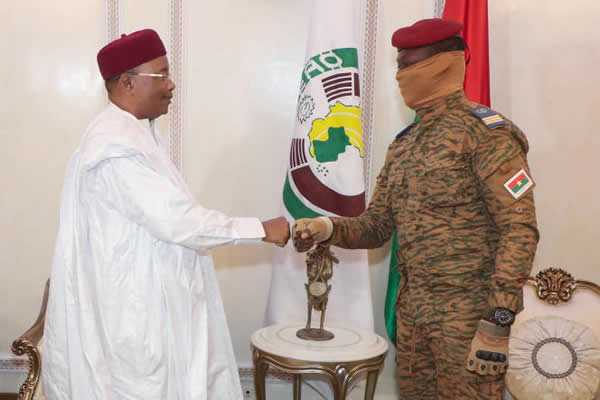
As a delegation from the West African political bloc ECOWAS arrived in Ouagadougou on Tuesday, protesters took to the streets outside the airport. They shouted anti-French and anti-ECOWAS slogans and said it was time for Burkina Faso to manage its own return to security.
The country has been locked in a conflict with militant groups linked to Islamic State and al-Qaida for almost seven years, experiencing its second coup in eight months this weekend. ECOWAS is expected to establish relations with the new junta leader, Captain Ibrahim Traore, and to reinforce a two-year transition period for the country to return to democracy set up under the previous junta.
“They may want to gently explore what the attitude of the new leadership is towards military cooperation with other ECOWAS countries and particularly Niger, with whom the [Paul-Henri Sandaogo] Damiba regime had built a particularly strong, close military partnership,” said Paul Melly, an analyst at U.K.-based think tank Chatham House. “And they may hope also to get a bit of a steer as to whether the new regime will maintain the military cooperation with French forces.”
Burkina Faso is seen as a strategic lynchpin in the western Sahel conflict, with terrorism already spreading from its southern border to West Africa’s coastal states. ECOWAS has a major stake in Burkina Faso’s success in security matters.
“If Burkina Faso falls, or as it falls, it puts in danger a lot of other countries that surround Burkina Faso,” said Michael Shurkin, an analyst with 14 North Strategies, a Washington-based consultancy.
At the protests today and over the weekend, many demonstrators could be seen waving Russian flags, while the junta has indicated it is looking to turn to new international partners, potentially Russia, to help rectify its security problems.
“This also is bad news because whereas the French have made mistakes, the French at heart were trying to secure the area and create security,” said Shurkin. “The Russians have no such goals. The Russians are there to destabilize the region and stick as many fingers in the eyes of France as is possible to make everything worse. We’ve already seen from Mali what Wagner would do if they were to come to Burkina Faso, which is basically just to kill civilians.”
Andrew Lebovich is a research fellow at the Clingendael Institute, a Netherlands-based think tank. Asked what he thought the new junta could mean for security in Burkina Faso and the region, he said “it’s already a dire security situation, so anything that’s further disruptive to the armed forces, to the chain of command, to ongoing operations would have a negative impact. It’s going to make the already meager level of regional cooperation more complicated and more difficult.”
Thousands have died in Burkina Faso due to the conflict; almost 2 million people have been displaced.
Source: voanews.com











